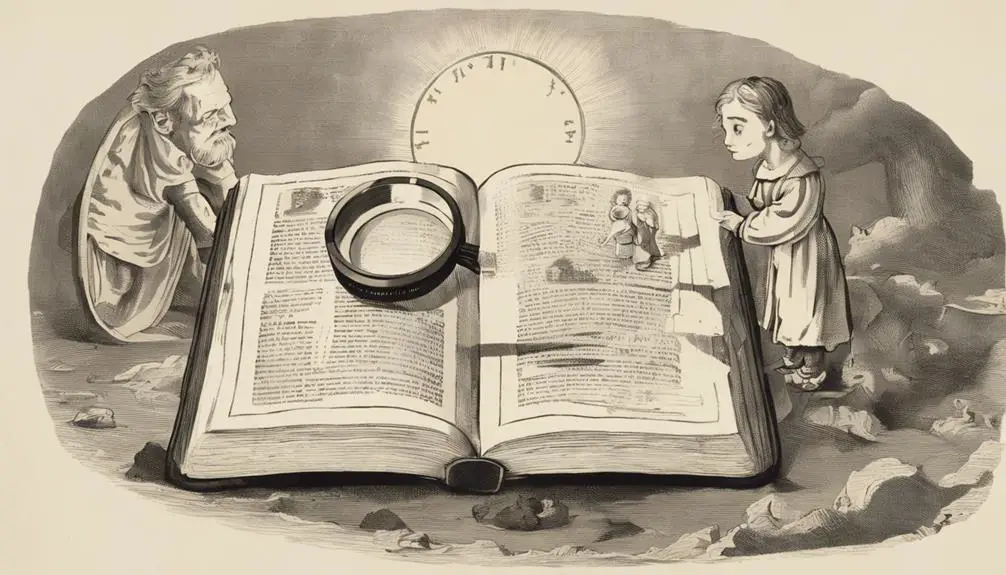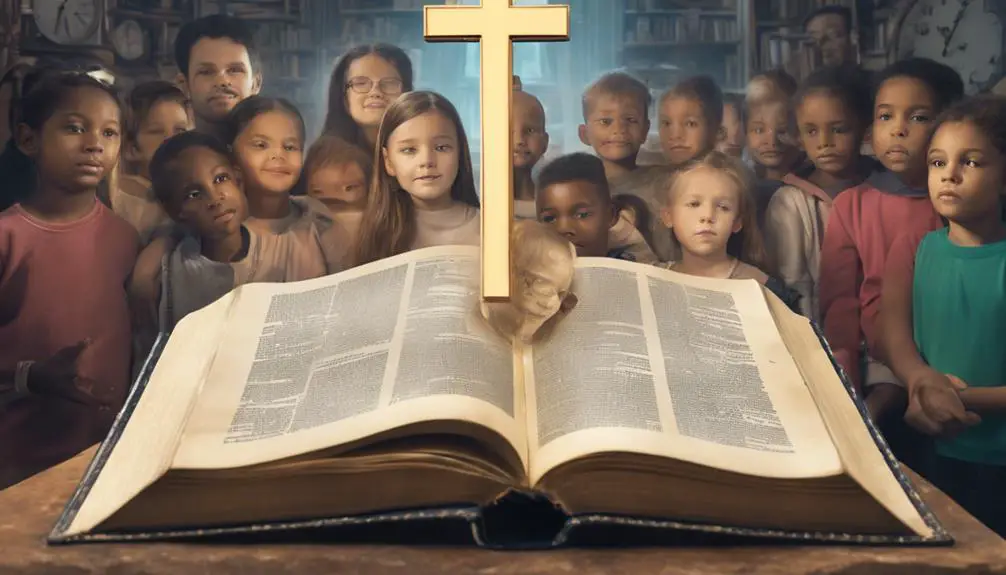Curious about the age of accountability in the Bible? Unearth biblical insights on this complex and thought-provoking topic.

Are There Any Bible Verses About Age of Accountability
Have you ever wondered if there are Bible verses that discuss the age of accountability?
You're not alone in this quest to understand at what age, according to the Bible, one becomes accountable for their actions.
It's a topic that has sparked numerous interpretations, debates, and discussions among theologians and believers alike.
Let's explore this intriguing subject together and see what light the Scriptures may shine on it. Trust me, it's a journey you'll want to embark on.
Key Takeaways
- The Bible doesn't explicitly mention the 'Age of Accountability' but implies it in verses like Deuteronomy 1:39, Isaiah 7:16, and Matthew 18:1-6.
- The age of accountability varies among different denominations, ranging from seven in Catholicism to thirteen in some Protestant traditions.
- The concept of the age of accountability helps frame moral responsibility within a developmental context in Christianity.
- The age of accountability influences religious education, rites of passage, pastoral care strategies, and engagement with younger church members.
Understanding the Age of Accountability

To truly grasp the concept of the Age of Accountability in a biblical context, you must delve deeply into the scriptures and theological interpretations. It's crucial to understand that the term 'Age of Accountability' isn't directly mentioned in the Bible. So, how did it emerge? It's derived from various biblical principles and is a theological construct used to denote a certain age at which an individual becomes morally and spiritually responsible for their actions.
You'll find that the concept is heavily debated among theologians, with no universally agreed-upon age. Some propose it's when a child can differentiate between right and wrong, others tie it to the onset of puberty. The Catholic Church, for instance, considers the age of seven as the 'age of reason', where a child can discern good from evil.
However, it's important to note that the Age of Accountability is a human interpretation and not a hard and fast rule within biblical theology. The Bible emphasizes personal responsibility and moral awareness, and the concept of the Age of Accountability helps to frame this within a developmental context.
Old Testament References

Delving into the Old Testament, you'll find several verses that have been interpreted as suggesting the existence of an Age of Accountability. The most frequently cited is Deuteronomy 1:39. In this verse, Moses refers to children who 'have no knowledge of good or evil' as being promised by God to enter the Promised Land. The phrase 'no knowledge of good or evil' is often seen as an indicator of moral innocence, a state presumably lost at a certain age of maturity.
Another potential reference is found in Isaiah 7:16. This verse speaks of a boy who, before reaching the age to 'reject the wrong and choose the right,' will see the devastation of two kingdoms. The implication being that there's a specific age when moral discernment develops.
Also, note the account of Jonah and the city of Nineveh. When God spares Nineveh, He cites the 'more than 120,000 persons who don't know their right hand from their left' (Jonah 4:11), usually interpreted as children.
However, these references don't provide a specific age. They merely suggest that children reach a point of moral accountability, a concept not foreign to Old Testament theology.
New Testament Insights

Shifting your focus to the New Testament, you'll find that while it doesn't explicitly mention the Age of Accountability, certain verses provide insights that may suggest its existence. For instance, Jesus' discourse in Matthew 18:1-6, where He emphasized that to enter the kingdom of heaven, one must become 'like little children,” may suggest a special consideration for the innocent and naive.
The Apostle Paul's writings, especially in Romans 7:9, reveal a progression in awareness of sin: 'I was alive once without the law, but when the commandment came, sin revived and I died.' Here, Paul could be alluding to a time in his life when he was innocent, unaware of the law's demands and his resulting transgressions. It's only with the 'coming of the commandment' that sin 'revived', indicating a newfound awareness and responsibility for his actions.
Interpretations From Various Denominations

Drawing upon the diversity within Christianity, different denominations interpret the concept of the Age of Accountability in unique ways, each shaping their understanding based on their theological perspectives and scriptural interpretations.
In Catholicism, the age is generally considered to be seven, coinciding with the Sacrament of Penance. You'll find that the Eastern Orthodox Church doesn't specify an age, instead emphasizing the importance of lifelong repentance and confession.
In contrast, Protestant denominations often reference the Jewish tradition of Bar or Bat Mitzvah, setting the age around 12 or 13. However, it's interesting to note that some Evangelical and Baptist churches don't stress a particular age but focus on an individual's personal understanding and conviction of sin. For them, it's more about the individual's spiritual maturity than a specific age.
The Church of Jesus Christ of Latter-day Saints, on the other hand, sets it at eight, coinciding with baptism.
In your exploration of the concept, you'll see that the Age of Accountability isn't universally defined across Christianity. It's shaped by theological interpretations, cultural practices, and the emphasis placed on personal spiritual development.
Application in Modern Christianity

In modern Christianity, the application of the Age of Accountability concept frequently influences the way churches engage with their younger members, often shaping religious education programs, rites of passage, and pastoral care strategies. This concept provides a framework for understanding when a child becomes morally responsible for their actions and capable of making faith-based decisions.
| Application Area | Impact
— |
— |
|---|---|
Religious Education |
Programs are typically designed to educate children about Christian teachings before they reach the age of accountability, preparing them to make informed faith decisions. |
Rites of Passage |
Many churches perform rites such as confirmation or baptism around the age of accountability, symbolizing the child's readiness to undertake Christian responsibilities. |
Pastoral Care Strategies |
Pastors often use the concept to guide their counseling approaches, distinguishing between pre-accountability children and those who've reached this significant milestone. |
The age of accountability concept, while not explicitly defined in the Bible, has a profound impact on how modern Christianity approaches the spiritual development of its younger members. This underscores the importance of further study and understanding of this concept within the broader Christian community.
Conclusion
So, it's clear there's no explicit 'age of accountability' in the Bible. Old and New Testament scriptures hint at moral awareness and culpability, but interpretations vary among denominations.
Today's Christian practices reflect these diverse interpretations. Nonetheless, the underlying message remains; it's the journey of spiritual growth and understanding, not a specific age, that truly matters in the eyes of God.



Sign up